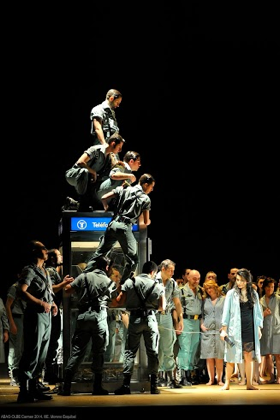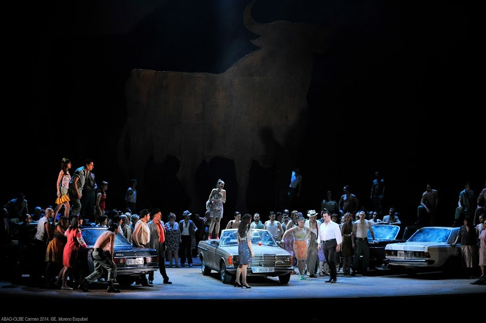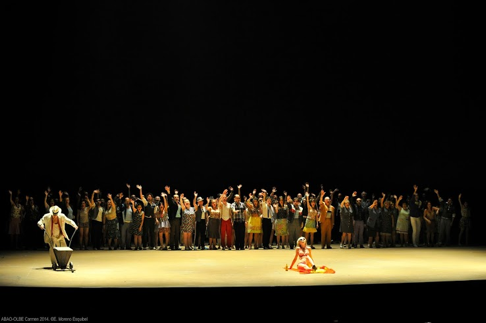
24 Feb 2014
Carmen in Bilbao
Bilbao is always news, Calixto Bieito is always news, Carmen with a good cast is always news. So here is the news.
English Touring Opera are delighted to announce a season of lyric monodramas to tour nationally from October to December. The season features music for solo singer and piano by Argento, Britten, Tippett and Shostakovich with a bold and inventive approach to making opera during social distancing.
This tenth of ten Live from London concerts was in fact a recorded live performance from California. It was no less enjoyable for that, and it was also uplifting to learn that this wasn’t in fact the ‘last’ LfL event that we will be able to enjoy, courtesy of VOCES8 and their fellow vocal ensembles (more below …).
Ever since Wigmore Hall announced their superb series of autumn concerts, all streamed live and available free of charge, I’d been looking forward to this song recital by Ian Bostridge and Imogen Cooper.
The Sixteen continues its exploration of Henry Purcell’s Welcome Songs for Charles II. As with Robert King’s pioneering Purcell series begun over thirty years ago for Hyperion, Harry Christophers is recording two Welcome Songs per disc.
Although Stile Antico’s programme article for their Live from London recital introduced their selection from the many treasures of the English Renaissance in the context of the theological debates and upheavals of the Tudor and Elizabethan years, their performance was more evocative of private chamber music than of public liturgy.
In February this year, Albanian soprano Ermonela Jaho made a highly lauded debut recital at Wigmore Hall - a concert which both celebrated Opera Rara’s 50th anniversary and honoured the career of the Italian soprano Rosina Storchio (1872-1945), the star of verismo who created the title roles in Leoncavallo’s La bohème and Zazà, Mascagni’s Lodoletta and Puccini’s Madama Butterfly.
Evidently, face masks don’t stifle appreciative “Bravo!”s. And, reducing audience numbers doesn’t lower the volume of such acclamations. For, the audience at Wigmore Hall gave soprano Elizabeth Llewellyn and pianist Simon Lepper a greatly deserved warm reception and hearty response following this lunchtime recital of late-Romantic song.
Collapsology. Or, perhaps we should use the French word ‘Collapsologie’ because this is a transdisciplinary idea pretty much advocated by a series of French theorists - and apparently, mostly French theorists. It in essence focuses on the imminent collapse of modern society and all its layers - a series of escalating crises on a global scale: environmental, economic, geopolitical, governmental; the list is extensive.
For this week’s Live from London vocal recital we moved from the home of VOCES8, St Anne and St Agnes in the City of London, to Kings Place, where The Sixteen - who have been associate artists at the venue for some time - presented a programme of music and words bound together by the theme of ‘reflection’.
'Such is your divine Disposation that both you excellently understand, and royally entertaine the Exercise of Musicke.’
Amongst an avalanche of new Mahler recordings appearing at the moment (Das Lied von der Erde seems to be the most favoured, with three) this 1991 Mahler Second from the 2nd Kassel MahlerFest is one of the more interesting releases.
‘And there was war in heaven: Michael and his angels fought against the dragon; and the dragon fought and his angels, And prevailed not; neither was their place found any more in heaven … that old serpent … Satan, which deceiveth the whole world: he was cast out into the earth, and his angels were cast out with him.’
If there is one myth, it seems believed by some people today, that probably needs shattering it is that post-war recordings or performances of Wagner operas were always of exceptional quality. This 1949 Hamburg Tristan und Isolde is one of those recordings - though quite who is to blame for its many problems takes quite some unearthing.
There was never any doubt that the fifth of the twelve Met Stars Live in Concert broadcasts was going to be a palpably intense and vivid event, as well as a musically stunning and theatrically enervating experience.
‘Love’ was the theme for this Live from London performance by Apollo5. Given the complexity and diversity of that human emotion, and Apollo5’s reputation for versatility and diverse repertoire, ranging from Renaissance choral music to jazz, from contemporary classical works to popular song, it was no surprise that their programme spanned 500 years and several musical styles.
The Academy of St Martin in the Fields have titled their autumn series of eight concerts - which are taking place at 5pm and 7.30pm on two Saturdays each month at their home venue in Trafalgar Square, and being filmed for streaming the following Thursday - ‘re:connect’.
The London Symphony Orchestra opened their Autumn 2020 season with a homage to Oliver Knussen, who died at the age of 66 in July 2018. The programme traced a national musical lineage through the twentieth century, from Britten to Knussen, on to Mark-Anthony Turnage, and entwining the LSO and Rattle too.
With the Live from London digital vocal festival entering the second half of the series, the festival’s host, VOCES8, returned to their home at St Annes and St Agnes in the City of London to present a sequence of ‘Choral Dances’ - vocal music inspired by dance, embracing diverse genres from the Renaissance madrigal to swing jazz.
Just a few unison string wriggles from the opening of Mozart’s overture to Le nozze di Figaro are enough to make any opera-lover perch on the edge of their seat, in excited anticipation of the drama in music to come, so there could be no other curtain-raiser for this Gala Concert at the Royal Opera House, the latest instalment from ‘their House’ to ‘our houses’.
"Before the ending of the day, creator of all things, we pray that, with your accustomed mercy, you may watch over us."

Bilbao is always news, Calixto Bieito is always news, Carmen with a good cast is always news. So here is the news.
The Calixto Bieito Carmen is old news, this edition having already taken place in Barcelona, Venice and Torino, though a Bieito Carmen has been around on advanced European operatic stages since 1999. It was never headline news, finding instead this extraordinary stage director in a rather subdued state. Yes, there was fellatio, pissing, nudity, gang rape, child abuse and true brutality. Yes, Mercedes was Lilas Pastia’s middle-aged wife, and yes, Don Jose was really annoyed by an insistent Micaëla who sang her pretty song and then gave Carmen the “up-yours.”
Bieito creates a world that puts you on edge, here it was Spain with the cut-out bulls on the hilltops, gypsies in dilapidated cars, freaked out youth, blinding beaches and lurid tourism, and of course bull rings. But finally Bieito’s bull ring was only a chalk-line circle laid down by Lilas Pastia in which the raw power of Carmen’s indifference was pitted against the impotent supplications of Jose. Murdered, Jose dragged Carmen out of the circle — like a dead bull.
Movement is violent and often sudden in this and all Bieito worlds. There were very limited moments of dialogue but many additions of crowd noise and shouts, and punctuations of imposed silence broken by frenetic crowd clamor. The quintet was splendidly staged catching the lightening speed of the music in fast, demonstrative movement, and the trio was deadpan, the cards read on the hood of a car with no sense of doom, Carmen indifferent to her fate.
 Act III. Escamillo in white shirt. Photo by E. Moreno Esquibel
Act III. Escamillo in white shirt. Photo by E. Moreno Esquibel
There was no set. A simple cyclorama against which there was first a flag pole and a phone booth, then a car and a Christmas tree, then eight cars and a gigantic cut out bull and finally nothing except a beach with a marked out chalk ring.
All this might seem a recipe for a dynamite Carmen, but this does not seem to be Bieito’s intention. This tale of Jose’s infatuation disappeared into this cosmos of marginal life in Spain and became unimportant, its emotions melted into the morass of a much bigger and equally violent, emotionally raw world.
With some setbacks along the way Bilbao's Amigos de la Ópera managed a cast responsive to the needs of both Bizet and Bieito. The Carmen announced in the publicity was Sonia Ganassi who withdrew because of illness, young Italian mezzo Giuseppina Piunti came to replace her. However she could not do this second performance (of five) thus this performance fell to the cover Carmen. Ana Ibarra is a young Spanish artist, not a Carmen by nature or physique but a very fine singer, and with obviously limited rehearsal attention she still gave a quite credible performance, greatly appreciated by the audience.
 Lilas Pastia marking bull ring circle and sunbather. Photo by E. Moreno Esquibel
Lilas Pastia marking bull ring circle and sunbather. Photo by E. Moreno Esquibel
Venezuelan tenor Aquiles Machado is in his vocal prime, and gave a beautifully sung performance. His Flower Song was the hit of the evening, the high notes squarely placed and exciting. Mr. Machado projects an affecting presence, and could perhaps be a moving Jose in a heated or even warmer production. Quick on his feet he was able to have a real looking knife fight with Escamillo, leaping from roof to roof of a line of cars. He was equaled in agility by seasoned Spanish baritone Carlos Alvaro! This esteemed singer brought a sharp Italianate edge to the role, making Escamillo a powerful and dangerous presence with real bullfighter voiced coglioni if not with physique or stance.
Micaëla was sung by Valencia born soprano Maite Alberola who brought a brightness of voice that has made her a fine traviata though she did not move with a natural agility in the wonderfully tacky clothing that was her costume. With the resources of a traviata voice (a brilliant top and a warm middle voice) she found unusual and very welcome vocal excitement in her aria.
French maestro Jean Yves Ossonce provided a generally idiomatic reading, giving the principals solid understanding for their arias — a faster than usual “Je dis,” a louder than usual "La fleur que tu m'avais jetée," as examples. The quintet was masterfully held together and the big chorus scenes were unleashed with sonic abandon — the Euskadiko Orkestra Sinfonikoa gave it their all.
The support roles — Frasquita, Mercedes, Remendado, Dancairo, Zuniga and Morales — were of proper age, voice, and experience (i.e. gratefully not pieced together from a young artist program). The Mercedes of Basque mezzo Itxaro Mentxaka was especially interesting as the middle aged wife of Lilas Pastia, the Zuniga of Italian Federico Sacchi stood out as a real sleaze, his brutally murdered body an unforgettable image.
Bilbao is about architecture, as you know. There is an old (nineteenth century), imposing opera house said to be an imitation of Paris’ Garnier that is no longer used. The Asociación Bilbaina de Amigos de la Ópera now produces its operas in the theater of the Palacio Euskalduna, Bilbao’s conference center that opened in 1999. Designed by architects Federico Soriano and Dolores Palacios it is supposed to be like a vessel permanently under construction (it stands on a dock of the former Euskalduna Shipyard). It received the 2001 Enric Miralles award at the 6th Biennial of Spanish Architecture.
However striking the architecture may be, and the public areas are of interest if a bit hard to navigate, the hall itself reveals the lack of interest architects in general seem to have for opera. If these two architects had ever been to an opera they would know that an auditorium is a dark place to sit while you observe a performance, that no prime seating space should be sacrificed to some questionable geometric design whims, that every seat should be as close as possible to the stage (the upper reaches of this theater are unbelievably remote), and finally, actually first of all, that the sound in the hall is of utmost importance (the cavernous depths of this theater create a hollow “cavernous” sound).
Ignoring these completely obvious requirements for the auditorium one can only imagine the ignorance these architects will have exercised in designing the stage (here too wide), wings and dressing rooms. Is there no prize for bad theater architecture. There is a stupendous amount of it worldwide that could compete for being the absolute stupidest.
Michael Milenski
Casts and production information:
Carmen: Ana Ibarra; Don José: Aquiles Machado; Escamillo: Carlos Álvarez; Micaëla: Maite Alberola; Mercedes: Itxaro Mentxaka; Frasquita: Elena Sancho Pereg; Le Remendado: Vicenç Esteve; Le Dancaïre: Damián del Castillo; Zuniga: Federico Sacchi; Moralès: Giovanni Guagliardo; Lilas Pastia (actor): Abdelazir El Mountassir. Euskadiko Orkestra Sinfonikoa, Coro de Opera de Bilbao. Conductor: Jean Yves Ossonce; Mise en scène: Calixto Bieito; Scenery: Alfons Flores; Costumes: Mercé Paloma; Lighting: Alberto Rodriguez. Palacio Euskalduna, Bilbao, February 18, 2014.